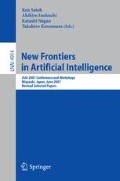Abstract
We model semantic interpretation operationally: constituents interact as their combination in discourse evolves from state to state. The states are recursive data structures and evolve from step to step by context sensitive rewriting. These notions of context and order let us explain inverse scope quantifiers and their polarity sensitivity as metalinguistic quotation of the wider scope.
Access this chapter
Tax calculation will be finalised at checkout
Purchases are for personal use only
Preview
Unable to display preview. Download preview PDF.
References
Trueswell, J.C., Tanenhaus, M.K. (eds.): Approaches to Studying World-Situated Language Use: Bridging the Language-as-Product and Language-as-Action Traditions. MIT Press, Cambridge (2005)
Plotkin, G.D.: A structural approach to operational semantics. Technical Report DAIMI FN-19, Department of Computer Science, University of Aarhus, Revised version submitted to Journal of Logic and Algebraic Programming (1981)
Felleisen, M.: The Calculi of λ v-CS Conversion: A Syntactic Theory of Control and State in Imperative Higher-Order Programming Languages. PhD thesis, Computer Science Department, Indiana University Also as Tech.Rep. 226 (1987)
Felleisen, M.: The theory and practice of first-class prompts. In: POPL 1988. Conference Record of the Annual ACM Symposium on Principles of Programming Languages, pp. 180–190. ACM Press, New York (1988)
Danvy, O., Filinski, A.: A functional abstraction of typed contexts. Technical Report 89/12, DIKU, University of Copenhagen, Denmark (1989), http://www.daimi.au.dk/~danvy/Papers/fatc.ps.gz .
Danvy, O., Filinski, A.: Abstracting control. In: Proceedings of the 1990 ACM Conference on Lisp and Functional Programming, pp. 151–160. ACM Press, New York (1990)
Danvy, O., Filinski, A.: Representing control: A study of the CPS transformation. Mathematical Structures in Computer Science 2, 361–391 (1992)
Barker, C., Shan, C.c.: Types as graphs: Continuations in type logical grammar. Journal of Logic, Language and Information 15, 331–370 (2006)
Shan, C.c., Barker, C.: Explaining crossover and superiority as left-to-right evaluation. Linguistics and Philosophy 29, 91–134 (2006)
Shan, C.c.: Linguistic side effects. In: Barker, C., Jacobson, P. (eds.) Direct Compositionality, pp. 132–163. Oxford University Press, New York (2007)
Shan, C.c.: Linguistic Side Effects. PhD thesis, Harvard University (2005)
Fry, J.: Negative polarity licensing at the syntax-semantics interface. In: Cohen, P.R., Wahlster, W. (eds.) Proceedings of the 35th Annual Meeting of the Association for Computational Linguistics and 8th Conference of the European Chapter of the Association for Computational Linguistics, pp. 144–150. Morgan Kaufmann, San Francisco (1997)
Fry, J.: Proof nets and negative polarity licensing. In: Dalrymple, M. (ed.) Semantics and Syntax in Lexical Functional Grammar: The Resource Logic Approach, pp. 91–116. MIT Press, Cambridge (1999)
Kiselyov, O., Shan, C.c., Sabry, A.: Delimited dynamic binding. In: ICFP 2006. Proceedings of the ACM International Conference on Functional Programming, pp. 26–37. ACM Press, New York (2006)
Shan, C.c.: Polarity sensitivity and evaluation order in type-logical grammar. In: Dumais, S., Marcu, D., Roukos, S. (eds.) Proceedings of the 2004 Human Language Technology Conference of the North American Chapter of the Association for Computational Linguistics, Somerset, NJ. Association for Computational Linguistics, vol. 2, pp. 129–132 (2004)
Kroch, A.S.: The Semantics of Scope in English. PhD thesis, Massachusetts Institute of Technology (1974) Reprinted by New York: Garland (1979)
Szabolcsi, A.: Positive polarity—negative polarity. Natural Language and Linguistic Theory 22, 409–452 (2004)
Taha, W., Nielsen, M.F.: Environment classifiers. In: POPL 2003. Conference Record of the Annual ACM Symposium on Principles of Programming Languages, pp. 26–37. ACM Press, New York (2003)
Quine, W.V.O.: Word and Object. MIT Press, Cambridge (1960)
Ladusaw, W.A.: Polarity Sensitivity as Inherent Scope Relations. PhD thesis, Department of Linguistics, University of Massachusetts (1979) Reprinted by New York: Garland (1980)
Shan, C.c.: Delimited continuations in natural language: Quantification and polarity sensitivity. In: Thielecke, H., ed.: CW 2004: Proceedings of the 4th ACM SIGPLAN Continuations Workshop. Number CSR-04-1 in Tech.Rep., School of Computer Science, University of Birmingham, 55–64 (2004)
Bernardi, R.: Reasoning with Polarity in Categorial Type Logic. PhD thesis, Utrecht Institute of Linguistics (OTS), Utrecht University (2002)
Bernardi, R., Szabolcsi, A.: Partially ordered categories: Optionality, scope, and licensing (2006), http://ling.auf.net/lingBuzz/000372
Kamp, H.: A theory of truth and semantic representation. In: Groenendijk, J.A.G., Janssen, T.M.V., Stokhof, M.B.J. (eds.) Formal Methods in the Study of Language: Proceedings of the 3rd Amsterdam Colloquium, Amsterdam, Mathematisch Centrum, pp. 277–322 (1981)
Groenendijk, J., Stokhof, M.: Dynamic predicate logic. Linguistics and Philosophy 14, 39–100 (1991)
Heim, I.: The Semantics of Definite and Indefinite Noun Phrases. PhD thesis, Department of Linguistics, University of Massachusetts (1982)
Felleisen, M., Friedman, D.P.: A syntactic theory of sequential state. Theoretical Computer Science 69, 243–287 (1989)
Karttunen, L.: Syntax and semantics of questions. Linguistics and Philosophy 1, 3–44 (1977)
Author information
Authors and Affiliations
Editor information
Rights and permissions
Copyright information
© 2008 Springer-Verlag Berlin Heidelberg
About this paper
Cite this paper
Shan, Cc. (2008). Inverse Scope as Metalinguistic Quotation in Operational Semantics. In: Satoh, K., Inokuchi, A., Nagao, K., Kawamura, T. (eds) New Frontiers in Artificial Intelligence. JSAI 2007. Lecture Notes in Computer Science(), vol 4914. Springer, Berlin, Heidelberg. https://doi.org/10.1007/978-3-540-78197-4_13
Download citation
DOI: https://doi.org/10.1007/978-3-540-78197-4_13
Published:
Publisher Name: Springer, Berlin, Heidelberg
Print ISBN: 978-3-540-78196-7
Online ISBN: 978-3-540-78197-4
eBook Packages: Computer ScienceComputer Science (R0)

